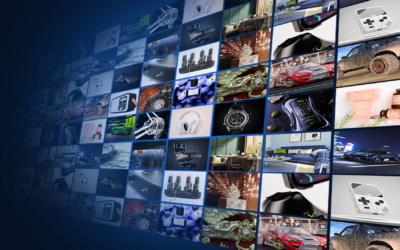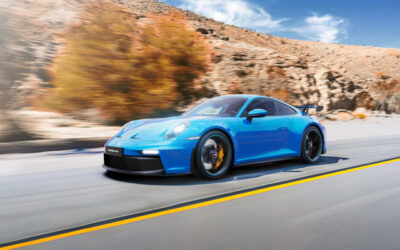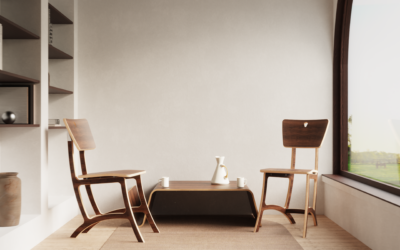The Delft Hyperloop is a climate-neutral, scalable Hyperloop system designed to transport passengers at speeds over 620 mph (1000 km/h). Over the past six months, the Delft University of Technology DH05 team has worked toward proving the technical and commercial viability of the Hyperloop concept. Part of this was the completion of a full-scale pod design. This month, it was successfully presented at European Hyperloop Week in Valencia, Spain.
Kamran Rahmani, Design Engineer with the DH05 Team, shared details about the pod’s interior on the KeyShot forum. As part of the design team, he was responsible for making the pod interior safe, comfortable, and practical for the passengers. “Each pod has private and social sections and one group room, fitting almost 50 people, he explains. “The interior is divided in modules for each row of seats, the doors and the luggage racks, that make the design feasible. The interior makes use of light colors, rounded shapes and natural materials to feel spacious, calm, and familiar. The chairs are designed for a comfortable and safe position and offers space for hand luggage. The merged side-by-side seats are a space-efficient solution to seat people socially, or individually, separated by an armrest. The sectioning in the interior wall offers personalized space with lights, charger ports, information screens and safety panels.”
What is unique about the design for the Delft Hyperloop interior?
At Delft Hyperloop, we are designing for the future. It means that we are working on a concept which is going to be available not now, but maybe in the next 5-10 years. So we could predict and use the design language that is going to be acceptable in that time.
In order to achieve this, we should set up lots of design research and we need to ask the opinion of the people and stack holders who are going to use the hyperloop or being involved in this industry directly or indirectly. We needed to describe our ideas and visualize our concept to make it possible to communicate with the potential users. That’s why we used KeyShot. KeyShot helped us prepare renderings that are almost the same as our imaginations of the hyperloop in a really short amount of time. We could easily test different lightings, materials, moods and ambient with it’s user-friendly settings, and it made it possible for us to decide on the final concept.
What was important to communicate about the design?
The Hyperloop is going to be a modern transportation system in which pods will travel with high speed (almost same as the planes but on the ground), inside vacuumed tubes. So engineers should spend the time to ensure safety while, the same time, designers should ensure the passengers feel the safety prepared for them. It’s not only about adding seat belts or oxygen masks, but also about using the shapes, forms, colors and materials in a way that everyone feels relaxed and calm during travel. In KeyShot, we could easily test different variations of the pod interior and compare them in order to ensure passengers really feel the safety, just by a single click.
Where do you see the advantages in using KeyShot to visualize the Hyperloop?
A lot of companies are involved in the hyperloop industry nowadays; Different people with different specialties are trying to make it possible for people to experience the high-speed vacuum tube travel. As an Industrial Designer at Delft Hyperloop, I present the concept many times to many people in many meetings, from the very first sketches, in order to receive all their comments and opinions, and to gradually develop the design by adding more details in different phases.
KeyShot saved a lot of time with import of the updated 3D models and in preparing renderings to showcase our design to various people and companies across all the meetings. It was really important for us to not shift between lots of different software, plugins and tools. We needed to save time and that’s why we think KeyShot was perfect. Everyone could send us 3D models exported from different CAD software and we could easily import them to KeyShot, because it supports all the CAD file formats we had.
Luxion is a partner of the Delft Hyperloop project, supporting the teams with the visualization software needed to visualize the future. Learn more about the project, technology, and teams at delfthyperloop.nl.















0 Comments